Guinea Bissau
Guinea-Bissau or Guinea-Bissao, in long form, the Republic of Guinea-Bissau is a Portuguese-speaking country in West Africa. Its capital is Bissau. The country is part of the Economic Community of West African States and the Organization of Islamic Cooperation.
Guinea-Bissau’s history
Pre-colonial history
Arrival of Gaspard Théodore Mollien in Bissao (1818). From the thirteenth century, the Mansayas (baronies of the Mali Empire), founded between 1235 and 1265 by the Mandingo general Tiramighan Traore who defeated and captured Kirikor, last king of Bainouk, then reunited from the seventeenth century under the form of the independent kingdom of Gabou (Kaabunké) gradually extended and exerted, in the West, a strong influence on the region and the other nations of this territory (Kingdom of Qinala, Balante Confederation, Seigneuries Brâmes / Papel, Seigneuries Felups / Diola, Nalu Kingdom), until the 18th century. The first European contacts were established in 1447 by the Portuguese navigator António Fernandes, a year after the death of Nuno Tristão in a naval battle at the mouth of the Gambia. Portugal rents several plots on the edge of rivers on which it establishes trading posts, notably in Cacheu, Bissau, Farim, Geba. In 1867, the kingdom of Gabu was defeated by the army of the Fulani and Muslim confederation of Fouta Djalon.
Colonial history
The region became a Portuguese colony in 1879 and then an overseas province in 1951. In 1959, a workers’ strike at the port of Bissau led to a massacre. Fifty workers are killed by the Portuguese police and more than 100 injured. This massacre constitutes a “turning point in the thinking of the revolutionary nationalists”, inciting them to reconsider the peaceful struggles waged hitherto to envisage armed struggle. In 1963, the African Party for the Independence of Guinea and Cape Verde (PAIGC) started the war of independence. The insurgency gradually met with the support of rural populations and the “liberated areas” spread over 50% of the territory from 1966, then 70% from 1968. Under the leadership of Amílcar Cabral, the rebels tried to reconstruct a political model where power would be exercised by the peasants themselves and undertake to develop the health system and literacy.
The objective goes beyond simple national independence. According to Cabral: “We are not just fighting to put a flag in our country and to have an anthem but to never again our people are exploited, not only by the imperialists, not only by Europeans, not only by people of white skin, because we do not confuse exploitation or the factors of exploitation with the skin color of men; we don’t want any more exploitation at home, not even by black people. ” The Portuguese leave the country after the Carnation Revolution in 1974, which becomes independent. The African Party for the Independence of Guinea and Cape Verde, which had led the political struggle and then the insurrection for independence for 12 years, won the elections.
History since independence
Since decolonization, the country has been plagued by chronic instability with six attempts to overthrow power by violence. No president was able to reach the end of his mandate. The army, in which the Balinese ethnicity is predominant, plays an essential role in the political life of the country. In 1980, economic conditions deteriorated significantly, leading to general dissatisfaction with the government in power. On November 14, 1980, João Bernardo Vieira known as “Nino Vieira” overthrew President Luís Cabral, half-brother of the independence leader Amílcar Cabral and in power since independence, by a bloodless military coup. The Constitution is suspended and a military council of nine members of the revolution chaired by Vieira is set up.
In 1984, a new constitution was approved and brought the country back to civil rule. Guinea-Bissau, like much of sub-Saharan Africa, turned to multiparty democracy in the early 1990s with the end of the Cold War. The ban on political parties was lifted in 1991 and elections were held in 1994. In the first round of the presidential election on July 3, 1994, Vieira received 46.20% of the vote against seven other candidates. He left the second round on August 7, victorious with 52.02% of the vote against 47.98% for Kumba Ialá, a former lecturer in philosophy, dissident of the PAIGC from which he was excluded in 1989 and president of the Social Renewal Party (PRS ). International election observers generally viewed the ballot as fair. Vieira was proclaimed the first democratically elected President of the Republic on September 29, 1994.
After a failed coup attempt against the government in June 1998, the country fell into a brief but violent civil war between forces that remained loyal to Vieira and those of the Chief of the Defense Staff, Ansoumane Mané, a former comrade-in-arms of the Head of State during the War of Independence. The rebels finally overthrow the government of João Vieira on May 7, 1999, who finds refuge in the Portuguese embassy before going into exile in Portugal. Kumba Ialá was elected president in 2000 but was overthrown by a bloodless coup in September 2003. A Balant ethnic group, he was accused of favoring his community and had discredited himself by dissolving the National Assembly in 2002 while constantly pushing back new legislative elections. The coup drew little protests from both the public and the international community. The country then again begins with difficulty a phase of democratic normalization, culminating in the organization of legislative elections in 2004 and a presidential election on July 24, 2005 which sees the return to the head of the country of João Bernardo Vieira says ” Nino Vieira “, the former president deposed in 1999 by a military coup which had presented itself independently. To govern, Nino Vieira, strongly contested within the PAIGC, concludes a tactical alliance with his historic enemy, General Batista Tagme Na Waie, by appointing Chief of Staff9 this boorish and illiterate character who has a fierce hatred for former President Vieira, who allegedly tortured him and threw him on a prison island following the coup attempt in November 1985. However, on March 1, 2009, the Chief of the Defense Staff, General Batista Tagme Na Waie, was killed in a bomb attack. President João Bernardo Vieira, whom certain soldiers hold responsible for this attack insofar as he had historically execrable relations with the latter, was assassinated in turn, on March 2, 2009, by men in arms. To succeed him, Malam Bacai Sanhá, PAIGC candidate, was elected president on July 26, 2009.
Guinea-Bissau’s politics
Guinea-Bissau’s economy
Guinea-Bissau is a member of the West African Economic and Monetary Union.
The main source of foreign exchange is the export of cashew nuts, which represents 60% of the country’s income. Guinea-Bissau is the 3rd producer of cashew nuts in Africa, and the 6th worldwide, with its production of 120,000 tonnes per year bringing in 60 million dollars. The country has many other natural resources: bauxite, wood, oil, phosphates … Its coastline, very rich in fish, attracts fishermen from the European Union who come to catch 500,000 tonnes of fish every year, paying in exchange for Guinea-Bissau around 7,500,000 €. The country’s agricultural potential is enormous, but its forest, for example, is only exploited informally. Despite its many strengths, Guinea-Bissau is the tenth poorest country in the world, among the least developed countries (LDCs). The human development index (HDI) was 0.289 in 2010 (position 164 among 196 countries). In 2005, the state budget was 75% dependent on international aid. There is no electricity everywhere and 80% of the inhabitants live on less than $ 1 a day.
Indeed, political instability, the aftermath of the 1999 civil war, the obsolescence of infrastructure discourage investors and therefore the possibilities of development. Due to its poverty and economic disorganization, Guinea-Bissau is easy prey for drug traffickers from South America who use it as a gateway to reach the European Union, their main client since the States -United States have tightened their border control policy. Guinea-Bissau has a privileged geographical position, in the south of Senegal, which excludes it from the illegal immigration control system, which extends from Morocco to Senegal and makes trafficking difficult. The South American drug is therefore stored in Guinea-Bissau, where it is then introduced in small quantities into market products (fruit, fish, cashew nuts) transported to Europe, or ingested by life-threatening mules. and their freedom for 5,000 € (their salary to deliver five hundred grams to one kilogram of cocaine in capsules). Guinea-Bissau, far from being a consumer of these “luxury” drugs that its inhabitants cannot afford, has become in a few years the hub of cocaine trafficking. The drug economy would represent an amount greater than the country’s GDP.
Guinea-Bissau’s demography
In 2010, the population of Guinea-Bissau was 1,533,964 inhabitants. It is made up of 40.8% of people under 14, 56.1% of 15 to 64 years and 3.1% of 65 years or more. Its population density is 42 inhabitants / km2. In 2010, the life expectancy of men was 46.07 years and that of women 49.79 years. The same year, the population growth rate is 2.019% with a birth rate of 35.97 ‰, a death rate of 15.79 ‰, an infant mortality rate of 99.82 ‰ 30 and a rate fertility rate of 4.58 children / woman.
Guinea-Bissau’s education
Guinea-Bissau’s languages
The official language of the country is Portuguese. The language of communication (and mother tongue of about a third of the population) is the Creole of Guinea-Bissau which developed from Portuguese. The different ethnic groups maintain their languages. English is widely spoken, especially among the younger generation from the country’s elite. English is also the language of a significant number of Nigerians and other English speakers from English-speaking countries in the Gulf of Guinea (Ghana, Liberia, Sierra Leone) who are mainly traders or entrepreneurs. English is also used by Chinese present in the country, who are mainly traders or entrepreneurs. Guinea-Bissau is surrounded by French-speaking countries and has a significant minority of its inhabitants with knowledge of French. The country has been a member of the International Organization of La Francophonie since 1979. The latter estimated in 2015 the number of Francophones in Guinea-Bissau at 275,000. According to the 2009 census, the most recent carried out in the country to date , 27.1% of the Guinean population can speak Portuguese. The last general census also reveals that Portuguese and French are spoken respectively by 46.3% and 10.6% of the population in urban areas and by 14.7% and 1.6% in rural areas.
-
Guinea Bissau
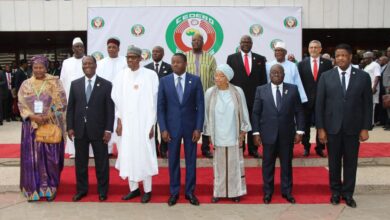
ECOWAS Begins Deploying Military Troops To Guinea-Bissau Following Failed Coup
The Economic Community of West African States (ECOWAS) on Monday began deploying military troops to Guinea-Bissau to help stabilize the…
Read More » -
Guinea Bissau

Guinea-Bissau’s President Umaro Sissoco Embalo Dissolves Country’s Parliament
Guinea-Bissau’s President Umaro Sissoco Embalo on Monday dissolved the country’s parliament and called for parliamentary elections by the end of…
Read More » -
Guinea Bissau

Guinea-Bissau’s President Embalo Says Ex-Navy Chief Arrested Over Failed Coup
Guinea-Bissau’s President Umaro Sissoco Embalo on Thursday accused a former Guinean navy chief and two of his accomplices of being…
Read More » -
Guinea Bissau
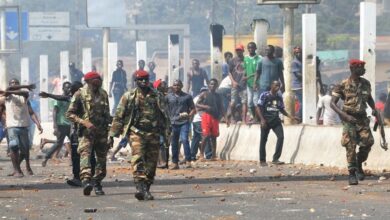
Guinea-Bissau’s Government Confirms 11 People Died During Failed Coup Attempt
Guinea-Bissau’s government on Thursday confirmed that at least 11 people died during the failed coup attempt that took place earlier…
Read More » -
Guinea Bissau
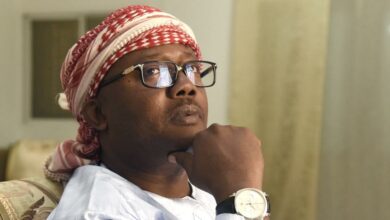
Guinea-Bissau’s Government Launches Major Investigation To Probe Failed Coup
Guinea-Bissau’s government on Wednesday said a major investigation has been launched to probe a failed attempt to oust President Umaro…
Read More » -
Guinea Bissau
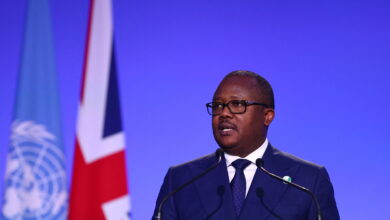
Guinea Bissau’s President Says Coup Attempt Killed Several Security Forces Members
Guinea-Bissau’s President Umaro Sissoco Embalo on Tuesday said an unsuccessful coup attempt has left many members of the security forces…
Read More » -
Guinea Bissau

Guinea-Bissau: President Umaro Embalo Announces End Of Night-Time Curfew
Guinea-Bissau’s President, Umaro Sissoco Embalo, on Thursday announced the end of the night-time curfew that was imposed to curb the…
Read More » -
Guinea Bissau
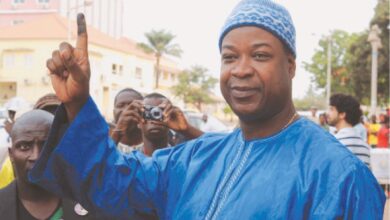
Guinea-Bissau: Prime Minister & Three Other Ministers Tests Positive For Corona
Guinea-Bissau’s Health Ministry on Wednesday confirmed Prime Minister Nuno Gomes Nabiam and three other cabinet members have tested positive for…
Read More » -
Guinea Bissau

Guinea-Bissau: ECOWAS Nations Recognizes Umaro Sissoco Embalo As President
A regional bloc of West African nations recognized Umaro Sissoco Embalo as president of Guinea-Bissau on Thursday, after four months…
Read More » -
Guinea Bissau

Guinea-Bissau: Umaro Cissoko Embalo Gets Sworn In As New President
Former Prime Minister Umaro Cissoko Embalo was sworn in as the new president of Guinea-Bissau on Thursday despite ongoing row…
Read More »

